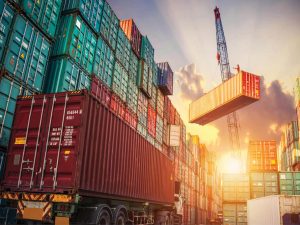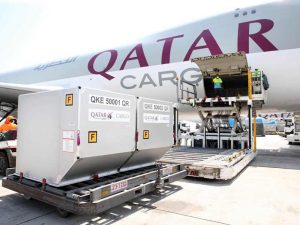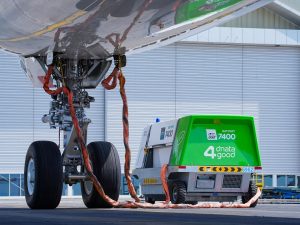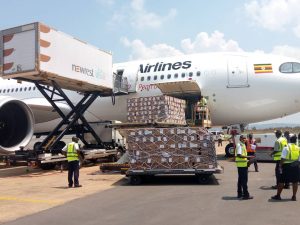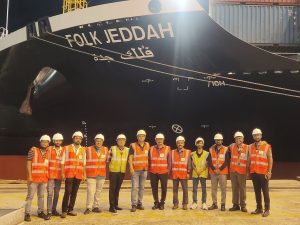Xeneta has announced a partnership with eeSea that will provide visibility into pro-forma transit times within the Xeneta platform, says LinkedIn post. “Integrating Xeneta’s market-leading ocean and air freight rate data with eeSea’s comprehensive port-to-port transit time data will enable shippers, freight forwarders and carriers to correlate transit times directly with rate fluctuations — providing a more holistic view of shipping performance,” post adds. “Our customers need to connect ocean transit times with the pricing they receive from suppliers,” says Thorsten Diephaus, Vice President, Strategic Alliances, Xeneta. “Adding eeSea’s pro-forma transit time data as well as real-time transit time data to Xeneta will empower our customers to make better decisions, and ultimately move us towards a more efficient and transparent global shipping ecosystem,” he adds.
Read More »‘Proper labelling, packaging, classification of DG crucial’
Prakash Singh, COO, Jeena Criticare Logistics says, “Handling dangerous goods requires strict adherence to safety protocols to prevent accidents and to ensure the safety of our personnel, equipment, and the environment. To maintain our commitment to safety and compliance and to ensure proper compliance Jeena Makes sure that each branch has DG certified person to handle DG shipments. While handling DG shipment, Jeena ensures Proper classification of Goods as per the Hazard class with proper labeling and marking to identify the nature of the risk involved followed by proper packing standards to prevent leaks, spills, or contamination during transport.”
Read More »Cargolux renews partnership with Unilode
Luxembourg-based cargo airline Cargolux and Unit Load Device (ULD) provider Unilode Aviation Solutions have renewed their longstanding partnership. Cargolux first awarded the management of its ULD fleet to Unilode in 2009. Unilode, which now has a fleet of 172,000 ULDs, provides a dedicated customer success management team based in Luxembourg, plus network planning through its operations control centre in Bangkok.
Read More »Qatar Cargo, Qatar Post ink pact to enhance operations
Qatar Airways Cargo has signed a co-operation agreement with Qatar Postal Service Company (Qatar Post). This strategic collaboration is a testament to their shared commitment towards postal activities and mail transportation to and from Doha. “We are pleased to strengthen our cooperation with Qatar Airways and look forward to achieving sustainable and mutually beneficial successes in postal and logistical services that serve our customers’ interests. We emphasise the importance of forming strategic partnerships between Qatar Post and national companies adhering to global standards such as Qatar Airways. In addition, our Mail product provides seamless 100 per cent EDI integration for bookings, a dedicated hub warehouse for streamlined operations, and end-to-end track and trace capabilities for real-time shipment visibility,” said Faleh Bin Mohammed Al-Naemi, Chairman and managing Director, Qatar Post said.
Read More »‘Safety & security of cargo will remain industry’s top priority’
Glyn Hughes, Director General, The International Air Cargo Agents Association of India (TIACA) says, “Safety and security are and will always remain the industry’s top priority. With regards to safety, Dangerous Goods handling and transport are subject to international and national regulations and carrier specific policies. The development of the various regulations take into account manufacturing developments, packaging standards and safe controls. Documentation, training and accountability ensure that all parties in the supply chain should be aware of what’s being moved, how it has been packaged and what safe controls to apply. There are regulations and standards applicable to cargo carried in passenger aircraft and different regulations and standards applied to all cargo freighter aircraft. This takes into account the different containment measures applicable in the various cargo holds and main deck environments. ICAO, through its Technical Instructions (TI), published every two years, provides the primary source of regulations for the safe carriage of dangerous goods. IATA then publishes its Dangerous Good Regulations manual which is based on the ICAO TI’s and adds additional chapters covering carrier specific requirements. One major area of focus is on the safe carriage of lithium batteries, volumes of which have grown significantly in recent years. Lithium batteries have undergone significant testing in an air cargo environment to determine the safest standards to apply. These standards include the maximum state of charge that a battery may hold whilst being shipped, it also covers quantities when loaded loose, quantities within appliances and other considerations. The key consideration though starts with knowing what is being carried and correct declaration.”
Read More »dnata grows green operations at DXB, invests $4m
Ground handler dnata has invested $4m in 14 new 180kVA electric ground power units (GPU) at Dubai International airport (DXB) to cut operational emissions. The new GPUs – a mobile or stationary device used to provide electrical power to aircraft while they are on the ground – will replace diesel equipment and reduce fuel consumption by 550,000 litres annually at DXB, said dnata. dnata’s first four electric GPUs have already been deployed, exclusively supporting Emirates Engineering’s services. The remaining 10 units are expected to arrive in November. Overall, the new equipment will handle 33% of all GPU utilisation at the airport. Jaffar Dawood, senior vice president, airport operations – UAE and MEA, dnata, said: “Our latest fleet investment underlines our ongoing commitment to using electric equipment wherever the airport’s infrastructure permits. “It reflects our focus on environmental responsibility and aligns with both customer expectations and the airport’s sustainability efforts. In addition, it improves operational efficiency and reduces maintenance needs.
Read More »India’s air cargo volumes to rise 11% YoY to 3.6-3.7 MT in fiscal 2024-25: ICRA
According to the latest ratings by ICRA, “India’s overall air cargo volumes are projected to see healthy growth of 9-11 per cent year on year (YoY) to 3.6-3.7 million tonnes in fiscal 2024-25 (FY25), supported by 11-13 per cent expansion in international and 4-6 per cent growth in domestic cargo. The international cargo volumes had seen a muted YoY rise of 1 per cent in the first half (H1) of FY24 on the back of the slowdown in the global economy and geopolitical conflicts. However, international cargo volumes witnessed a healthy expansion of 18 per cent in H2 FY24 amid the Red Sea crisis, which started in October 2023. Consequently, the seaborne cargo traffic was affected, which in turn benefitted international air cargo traffic, the report adds. “ICRA’s outlook on India’s airport infrastructure is stable, with revenues of ICRA’s sample set likely to grow by around 12-14 per cent YoY in FY25, supported by the sustained improvement in both domestic and international passenger traffic, increase in tariffs at some of the major airports and ramp-up in non-aeronautical revenues,” said Vinay Kumar G, vice president and sector head, corporate ratings, ICRA, in a release.
Read More »DP World strengthens connectivity between India & ME, welcomes new vessel
DP World welcomed the maiden call of the vessel M.V. Folk Jeddah at its Nhava Sheva International Container Terminal (NSICT). This maiden voyage marked the commencement of the India Red Sea Service (IRS). This new service will strengthen connectivity between key ports in India and contribute to enhanced trade flows across the Middle East. The IRS service’s port rotation includes: Nhava Sheva, Mundra, Jeddah, and Salalah, providing vital links to India’s two of the largest major ports to along its route. By reducing transit time and improving access to major ports, the new route will further support strong trade link for bilateral trade between the Middle East and India, promoting efficient movement of goods. Ravinder Johal, COO, Ports & Terminals, Operations & Commercial, DP World Subcontinent and MENA Region, said, “The commencement of the India Red Sea Service is a strategic step forward in enhancing trade connectivity across various regions that supports government’s vision of boosting exports by 2030. This service is designed to streamline supply chains and provide better connectivity to key ports, allowing businesses to operate with greater efficiency. This new service strengthens the trade links between India and the Middle East. At DP World, our aim is not only to support economic growth but also offer businesses faster access to emerging markets and optimize their supply chain.” DP World remains committed to minimizing its environmental impact and ensuring sustainable trade operations. The company has made significant strides in integrating renewable energy and sustainable practices into its terminal operations in India, with the goal of leading the maritime sector towards a greener future. As part of this effort, DP World’s Nhava Sheva terminals initiative of open access sourcing of …
Read More »‘We are enhancing individual performance & fostering a positive work environment’
Vishwachetan Nadamani, COO, Ecom Express says, “Our employees, especially our ground staff—including Distribution Center heads, delivery partners, and field executives—are the backbone of our operations, and their roles become even more crucial during the festive season, when their hard work doubles to meet the surge in demand. These rewards and incentive schemes reflect our commitment to motivating and recognizing the extraordinary efforts of our teams. Through these initiatives, we are enhancing individual performance and fostering a positive work environment, ultimately translating into an exceptional customer experience. This comprehensive program underscores Ecom Express’s dedication to fostering a motivating environment for its employees, promoting teamwork, and delivering exceptional service during one of the busiest times of the year.”
Read More »‘Scaling up warehousing capabilities, infrastructure & timely delivery crucial’
Ajay Rao. Founder, Emiza says, “We have scaled up warehousing capabilities to ensure that our clients can efficiently meet the sharp rise in demand during key festive periods like Diwali, Dussehra, and the year-end holiday season. At Emiza, we initiate our proactive hiring process in June to ensure that new employees are well-acquainted with our processes and operations before the festive season begins. This year, we’ve bolstered our workforce by 10-12% through additional manpower, with plans to integrate many of these employees into our permanent team post-festive season to maintain operational continuity. Particularly in the Fashion & Lifestyle and Home & Kitchen Appliances sectors, we are meeting this influx with our expanded workforce and optimised operations. These sectors are expected to drive a substantial portion of our business during the festive period. To further support our capacity during this busy time, we maintain a flexible pool of skilled workers in key locations across major cities, ready to be deployed to warehouses as needed. This ensures we are well-equipped to handle peak workloads efficiently. Additionally, employees are offered incentives for extra hours and higher productivity*. These incentives we offer our taskforce enables dedication and performance, helping us sustain high levels of efficiency during the busiest periods in the year.”
Read More » Cargo Breaking News
Cargo Breaking News
